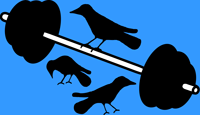Last month I asked readers to submit questions for a long form question and answer segment. Here they are.
“I wanted to ask you, my son has been begging me to take him to the gym. He’s a fit soon to be ten year old. Is he too young and if so or not can you recommend some exercises he can do for increasing speed and explosive first steps? He’s a soccer player. Is he too young to lift? If we do it together that would also help me.” - Mike
He’s not too young. He can start to learn good training habits now. I think that weight training should not be the focus yet but we’ll get into that.
The gym can be useful if you make it a special environment for serious focus. You can start taking him to the gym to work on building lifelong habits, focus, and technique. This is also a great opportunity to get yourself healthy and be a solid role model for your son, and to build that all important bond with your kid.
Priorities at his age and experience:
- Develop positive health and fitness habits and lifestyle
- Learn to work smart
- Develop basic proficiency and physical literacy starting with bodyweight exercises:
- Recline rows
- Chinups
- Squats
- Lunges
- Pushups
- Step-ups
- Planks and other midsection exercises
- Jump rope
- Callisthenics such as burpees, and jumping jacks
Make sure he becomes proficient at all of these exercises before he gets into more complex movements and begins to use weights. He will need constant supervision, and most gyms will require it.
Have him work on his running outside of the gym. For now, don’t worry so much about his speed and explosiveness. That will come as he develops his strength and efficiency.
Depending upon his maturity and commitment to good technique, at some point, using your judgement, you can start introducing him to light weights for high repetitions. Stick to simpler tools like medicine balls, dumbbells, kettlebells, and a stick or pvc pipe. Begin by having him apply these weights to the fundamental movements that he has already been practising. Let him develop further maturity, experience, technique and strength before introducing him to more complex movements.
Throughout this process the focus should remain on lifestyle, learning, and his relationship with you.
Keep the sessions short, varied, and fun. Take the opportunity to teach him about nutrition and sleep.
This simple approach can take you both a long way.
—--
“Is collagen in a supplement nonsense or real life?” -Michelle
I am not a big supplement user, so I went to my four go to nutrition guys to see what they had written.
Neither Peter Attia nor Andrew Huberman seem to have much to say on collagen. Nor does Lonnie Lowery.
I looked on John Berardi’s site and found one article, which wasn’t positive on collagen. The article did present a few points to ponder, which I outline below.
If you are considering taking collagen for connective tissue health, keep the following points in mind:
- It seems that most research has been funded by related industries.
- There is a general lack of good information and research.
There are some lifestyle steps to take care of and I think that these should be considered before supplementation:
- Eat a healthy diet with lots of quality protein. A good balance of amino acids will likely benefit your connective tissue.
- Get adequate sleep.
- Don’t smoke.
- Don’t drink to excess.
- Exercise.
If you are taking care of all of the above, and you want to delve into collagen or other supplements, then keep abreast of the research and proceed with due consideration.
Thanks to Mike and Michelle for sharing questions this month.
 RSS Feed
RSS Feed

